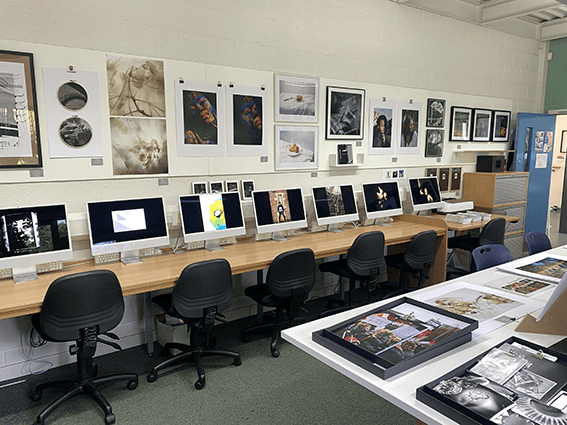Entry Requirements
Click the button to read our faculty brochure or read more about the course below:
- Six GCSEs 9-4 (or A*-C)
- Two from English, Maths OR Science
- Two at least grade 6
Course specific requirements:
If you do not have a GCSE grade 9-4 in any Art-based/iMedia subject and have not attended one of the New Students Days, or other taster sessions in Photography, you will be asked to show some example of your photographic ability at enrolment so that subject staff can assess suitability for the course. These can be in any format – on your phone, printed or posted online.
Please send any enquiries to the subject email: [email protected]

- How will photography evolve in the future?
- Can photography be considered a visual language?
There has never been a more relevant time to study photography with the recent surge in demand for visual content, including video and moving image. Careers as ‘content producers’ as well as professional blogging and influencing are on the rise. These platforms are now used extensively to advertise products and services.
Progression routes are to both H.E courses and directly into industry. Some routes require further study at university but others such as forensic, medical and freelance work can be pursued directly after A Level study. Apprenticeship opportunities in creative and digital media are also increasing. Many of our students have progressed into photography related careers.
This subject is an exciting, highly relevant and accessible subject to study at A Level.
Components
Component 1: Personal investigation (60% of a level)
You will produce two elements:
- A portfolio of practical work showing your personal response to either a starting point, brief, scenario or stimulus, devised and provided by the learner or centre.
- A related study: an extended response of a guided minimum of 1000 words.
Component 2: Externally Set Task (40% of total A Level)
You will respond to an externally set task which will provide a number of starting points. A response will be based on one of these options.
Skills
Throughout the course you will explore, research and acquire techniques and develop new skills, gain knowledge and understanding in a range of photographic media. You will work toward particular themes, ideas or issues and are encouraged to be experimental, innovative and enquiring in your approach. As well as developing your creative talents, you also learn to problem-solve, think analytically and creatively. This subject will encourage you to develop a deeper understanding and awareness of the world around you.
Careers/destinations
This subject can lead into many jobs in the creative industries such as magazine editor, medical photographer, press photographer, television camera operator, advertising, digital marketing, film/video editor, multimedia special- ist, visual merchandiser, web content manager/web designer, graphic designer,picture researcher, freelance pho- tographer, photographic technician, portrait/wedding photographer to name a few.
Photography
Do I need an art & design G.C.S.E to do this course?
No, we accept many students onto the course who have not studied an Art G.C.S.E subject. If you wish to be considered without an art G.C.S.E, you will need to provide a portfolio of work to enable us to assess whether or not you have the necessary skills. You can contact the department for details.
Do I need my own camera?
We provide everything you need to study this subject at A Level. We have a large number of digital SLR cameras, tripods and lenses for loan. There are two Apple Mac suites and a darkroom which students can use during lessons. Drop-in sessions are also available
What is covered on the course?
You will earn everything you need to complete the course successfully. The first year focuses on gaining essential skills and experiencing a variety of genres such as portraiture, location, still life, landscape and documentary photography. These are then applied in an increasingly independent way as you focus on a chosen area of study.
Is there an exam?
No, not in the traditional sense. You will complete a practical project called the externally set assignment that is based on a series of starting points provided by the exam board. You will then complete your final piece within a set 15-hour time frame.
Is there a lot of homework?
No more than any other A Level subject. However, you need to be aware that taking this subject can be time-consuming as the majority of your photographs will be taken for homework.
Is there a lot of writing?
No, this is predominantly a practical course. However, you will be expected to make notes about your work and there is a written research project which forms part of the Personal Investigation unit.
What careers can I go into?
Ultimately you can progress to a range of photography related careers such as fashion photography, journalism, social documentary, advertising and editorial. You may wish to enter a profession where a more fine-art approach is required such as teaching or delivering workshops. There are other areas of photography that have a more technical focus such as medical and forensic photography. Image-making technologies are progressing at a rapid pace and you may be interested in a profession that is related to developing these.
What can I study at H.E?
Photography will enable you to progress to most art-related degree courses. The UCAS points you get can be used to gain entry to the majority of degree course (but you should always check). We have had students from the department who have progressed onto a variety of degree courses at prestigious universities. These include Glasgow School of Art, Oxford and Cambridge.
What are the class sizes?
The class sizes are a maximum of 20.
Do you go on trips?
Yes! We frequently go out on shoots and visit galleries. There is a departmental trip abroad every year. We have been to Paris, New York, Berlin and Poland in the past. There are lots of extracurricular events within the department you can get involved with
